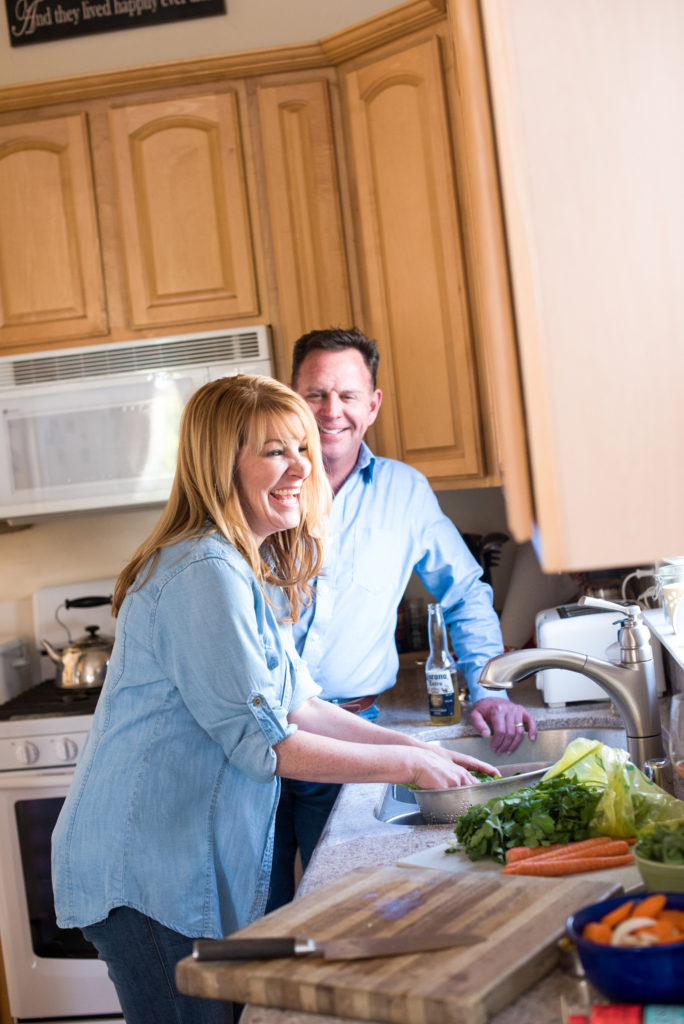
Up until my thirties my cooking skills were pretty limited and my meal planning consisted of heading to the grocery store to scan the aisles for what I considered to be “healthy” food at the time. Our meals were not very exciting (let’s just say I wore out the cord on our rice steamer) and we ate out a lot.
Fast forward to 2017 and we cook almost every meal at home now. My husband goes out a bit more than I do for business reasons but, as a couple, we eat out about once a week on average.
Eating out is fun and I believe we should all take a break from our kitchens to socialize and enjoy good food while letting someone else do the clean up. I also believe takeout has its place in our lives. There are days and even seasons in your life when it makes a lot of sense mentally and physically to let someone else do the cooking.
However, is it possible that Americans may be eating out too much these days? Statistics reveal that the average American eats out 4-5 times per week. According to the Bureau of Labor Statistics, in 2014, the average American household spent $2,787 on restaurant meals and takeout, compared to $3,971 on groceries. But in 2015, the average amount spent on restaurants and takeout jumped $221 to $3,008. Grocery spending, by contrast, increased just $44 per household to $4,015. This shows us that dining at restaurants and ordering takeout aren’t just luxuries anymore. They’re becoming the norm. People simply are not cooking as much.
I have to admit, when I first started meal planning it had EVERYTHING to do with saving money. Since I’m in the fitness industry I already had an idea about how to choose healthy foods. I just wanted to spend less in restaurants. However, over time, the more I cooked and learned about food, the more my husband and I began to prefer my cooking to most restaurants.
Last week, my husband was out of town and since I was cooking for one I decided to take a break from the kitchen and pick up a burrito from one of the local taquerias. The moment I took my first bite of the burrito I was reminded why I like to cook at home most of the time. It turned out to be mediocre and I realized that the ingredients were probably not the same quality I would have purchased. I ate the remaining half for lunch the next day and decided to cook for one for the rest of the week. It turns out I prefer my own cooking unless the chef is WAY better at it than I am.
Taste and cost are two really big drivers that motivate me to meal plan and cook at home even on the days I don’t feel like it. However there are other good reasons why I believe it pays off big to cook more at home.
EIGHT MORE REASONS TO COOK AT HOME MORE OFTEN
- You know what goes into the food. When I make our food, I get to choose how much butter, oil, salt, and sugar I add. Sometimes I add more than the recipe calls for and sometimes I cut it back. I can also make substitutions that I think are healthier for us like swapping out more refined grains for whole grains, adding more veggies, and choosing oils that I believe are better than others.
- You know where it came from. While some restaurants are now offering organic and all natural foods on their menus, not every restaurant does. It’s important to me to serve my family, guests, and even our pets food that I believe is as close to its natural state as possible. That doesn’t mean we buy all organic or avoid all processed food. It means that when I shop and choose which foods we will eat I pay close attention to where the food was sourced from and what ingredients or additives went into it.
- It can make a difference environmentally. As an animal lover and conservationist, I prefer to buy humanely raised meat and dairy as well as wild-caught sustainable seafood. Eating at home can limit the amount of packaging that needs to be recycled. We live on the San Francisco bay and it’s heartbreaking to see plastic and packaging wash up on the beach so I like to do my part to limit how much of it gets tossed into the bins at our house.
- You’ll have money to spend on other things. Eating out can be pricey. It’s amazing how much you save – and how many more high quality ingredients you can afford – when you eat at home.
- Quality time with your family. Studies have shown that kids who eat with their families frequently are less likely to get depressed, consider suicide, and develop an eating disorder. When a child is feeling down or depressed, family dinner can act as an intervention. This is especially true of eating disorders, says Dianne Neumark-Sztainer, PhD, a professor at the University of Minnesota’s School of Public Health, who has studied the impact of family meal patterns on adolescents. “If a child eats with his or her parents on a regular basis, problems will be identified earlier on,” she says. Sitting down to a meal is just as important for adults. It can help relieve stress and allow you to take a break from the busyness of life. For couples, it’s a great opportunity to catch up on each other’s day and build a stronger relationship.
- You can learn new skills. The more I cook, the more confident I feel in the kitchen. Some of the recipes I choose to experiment with now I would have totally avoided five years ago. Meal planning and cooking has helped me with my organizational skills and ability to stick to tasks long term.
- Eating leftovers saves you time. One of the bonuses of cooking at home is being able to freeze the leftovers or have them for lunch the next day. Freezing them allows you to have healthy meals ready to go on the days you’d rather not or don’t have time to cook and packing your lunch with healthy leftovers saves you the time of scouting out healthy food during your precious lunch break. Packing your lunch may even allow you time to take a midday walk or do a mini-workout.
- Weight Control. It may surprise you that as a personal trainer I listed weight management last. I did that on purpose. I personally believe that unless your body has an underlying medical issue if you focus on eating foods that fuel your body well most of the time and consuming portion sizes that are suitable for your lifestyle then your body will eventually settle into its natural weight. Food has been used way too often to manipulate bodies to be something they were not naturally designed to be so I encourage you to focus on eating a healthy variety of foods rather than just weight loss.
It’s true that cooking takes time which is precious to all of us. However, preparing tasty and healthy meals doesn’t have to be a long or complicated process. Start with simple recipes and give yourself permission to assemble pre-cooked food like a roasted chicken from your deli combined with a salad and some mashed sweet potatoes. Invest in tools like rice steamers and slow cookers so you can cook while you are doing other things. Experiment to discover what works for you and then roll with it.
Here’s to a happy, healthy, and full life!
Shared with love,
Jennifer


